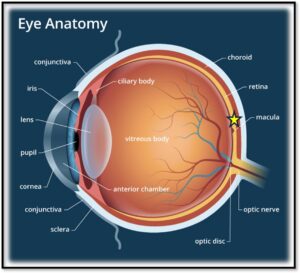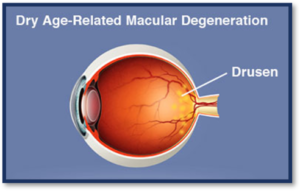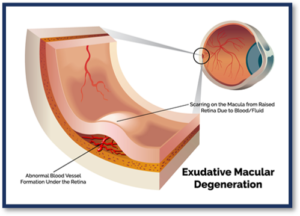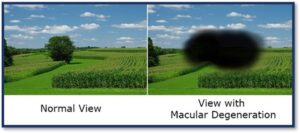To learn more about AMD, please visit Bausch + Lomb’s Sight Matters Facebook Page. Throughout the month of February, for every like or share on any post with the heading ‘Bausch + Lomb: 1 Like = $1 Donation’ a donation will be made to Prevent Blindness for up to $50,000. Let’s spread this good word and awareness for AMD together!
https://www.facebook.com/SightMattersCommunity

AMD and Your Eyes
Age-Related Macular Degeneration (AMD) is a chronic condition that affects adults’ central vision over time. AMD affects the macula of our eye (located on the retina).

The macula is responsible for helping us see objects and pick-up fine details in our central vision. Our central vision helps us participate in activities that require use of our fine motor skills (reading, writing, knitting, painting our nails, writing a check etc.) There are two types of AMD:
Dry AMD: The most common form; this occurs when small protein deposits (drusen) build up on the macula over time. Drusen can disrupt central vision and can affect how the macula functions and picks up light rays.

Wet AMD: More rare and most severe form. Dry AMD can lead to Wet AMD. About 10% of people with Dry AMD will progress to Wet AMD. Wet AMD occurs when blood vessels grow underneath and near the macula of our eye. The formation of abnormal blood vessels affects their ability to carry nutrients throughout the eye, making them more prone to becoming weak and breaking open, causing leaks and flooding into our central vision.

Unfortunately, many adults are unaware of the presence of AMD until permanent vision loss occurs. Common sign/symptoms of AMD include:

- Central vision shadows/blind spots
- Straight lines appearing wavy
- Trouble discerning colors
- Low vision
What is Low Vision: Low vision is a permanent reduction in visual acuity. Low vision affects daily activities of living and cannot be corrected with a pair of glasses/contact lenses. If you or someone you know has low vision, please contact Courtney at [email protected] for additional resources.
Risk Factors for AMD:
Aging: Aging is a beautiful process. However, aging can take quite the toll on adults’ vision health over time. As we age, the risk for eye conditions, such as age-related macular degeneration steadily increases. Additionally, vision concerns in older adults puts them at an increased risk for falls in and outside their home and can affect their independence and quality of life. To prevent or slow the progression of vision loss, it is recommended adults 60 years and older receive a dilated eye exam annually.
Family History: Genetics plays a big role in permanent eye conditions and diseases in adults. AMD is highly linked to genetics and many who have blood relatives with AMD are considered ‘at-risk’ for the disease. It is recommended if family history of AMD is present, to let your eye doctor know. This may determine how often they want to see you and the procedures and processes they will incorporate into your eye exam.